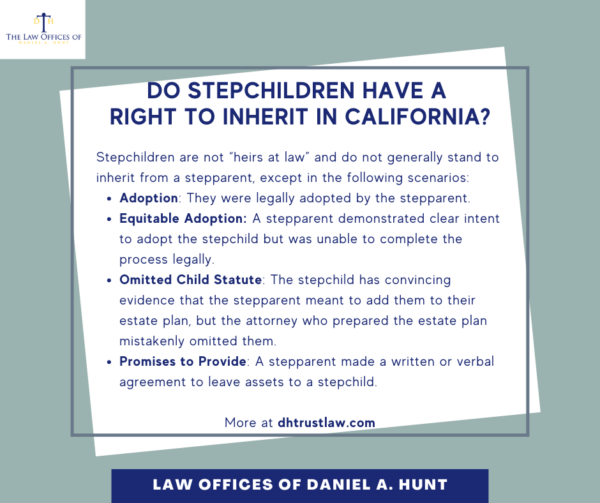Do Stepchildren Have a Right to Inherit in California?

Estate planning can often raise complex questions, especially when it comes to blended families. A common question asked in such situations is: Do stepchildren have a right to inherit in California? The short answer is: not automatically. Let’s explore the legal framework and steps you can take to ensure your wishes are honored.
California’s Laws on Inheritance
Under California law, stepchildren do not have an automatic right to inherit from a stepparent’s estate unless specific provisions are made in the stepparent’s estate plan. California intestate succession laws—which apply when someone dies without a will—prioritize biological and legally adopted children, as well as other blood relatives. Stepchildren are not included in this hierarchy.
Do Stepchildren Have Standing to Contest an Estate Plan?
Let’s say a stepparent dies and their stepchild was not specifically included in their estate plan. Would their stepchildren have standing to contest the estate plan? No, stepchildren would generally not have standing because they are not heirs at law.
Exceptions to the Rule
While stepchildren are not automatically entitled to inherit, there are some scenarios where they may have inheritance rights:
- Adoption: If a stepparent legally adopts their stepchild, the stepchild gains the same inheritance rights as a biological child under California law.
- Omitted Child Statute: In limited cases, stepchildren may claim rights under California’s “Omitted Child” statute if they can prove they were mistakenly excluded from a will or trust. They would need to show convincing evidence proving that their stepparent intended to add them to their estate plan, but that a mistake was made by the attorney who prepared the estate plan which left them out.
- Equitable Adoption: Courts may recognize equitable adoption in rare cases where a stepparent demonstrated clear intent to adopt the stepchild but was unable to complete the process legally.
- Promises to Provide: If a stepparent made a written or verbal agreement to leave assets to a stepchild, and the stepchild relied on that promise to their detriment, courts might enforce the agreement.
How to Include Stepchildren in Your Estate Plan
If you want to ensure your stepchildren inherit from your estate, it is essential to take proactive steps in your estate planning:
- Create a Will or Trust: Explicitly name your stepchildren as beneficiaries and specify what assets or percentages of your estate you want them to receive.
- Use Beneficiary Designations: Update beneficiary designations on accounts such as life insurance policies, retirement accounts, and payable-on-death accounts to include your stepchildren.
- Communicate Your Wishes: Clearly communicate your intentions with family members and your estate planning attorney to avoid potential disputes.
- Consult an Estate Planning Attorney: Estate planning can be complex, especially in blended families. An experienced estate planning attorney can help you navigate the legal landscape and ensure your wishes are properly documented.
Seek Legal Counsel
Blended families often have unique dynamics. Whether you want to ensure that your stepchildren are included or excluded in your estate plan requires thoughtful consideration. Without clear instructions, California’s intestacy laws will not provide for stepchildren, potentially leading to unintended consequences and family conflict.
If you’re concerned about your stepchildren’s inheritance or have questions about your estate plan, we’re here to help. Contact our office to schedule a no-cost initial consultation and take the first step toward securing your family’s future.
Law Offices of Daniel A. Hunt
The Law Offices of Daniel A. Hunt is a California law firm specializing in Estate Planning; Trust Administration & Litigation; Probate; and Conservatorships. We've helped over 10,000 clients find peace of mind. We serve clients throughout the greater Sacramento region and the state of California.




